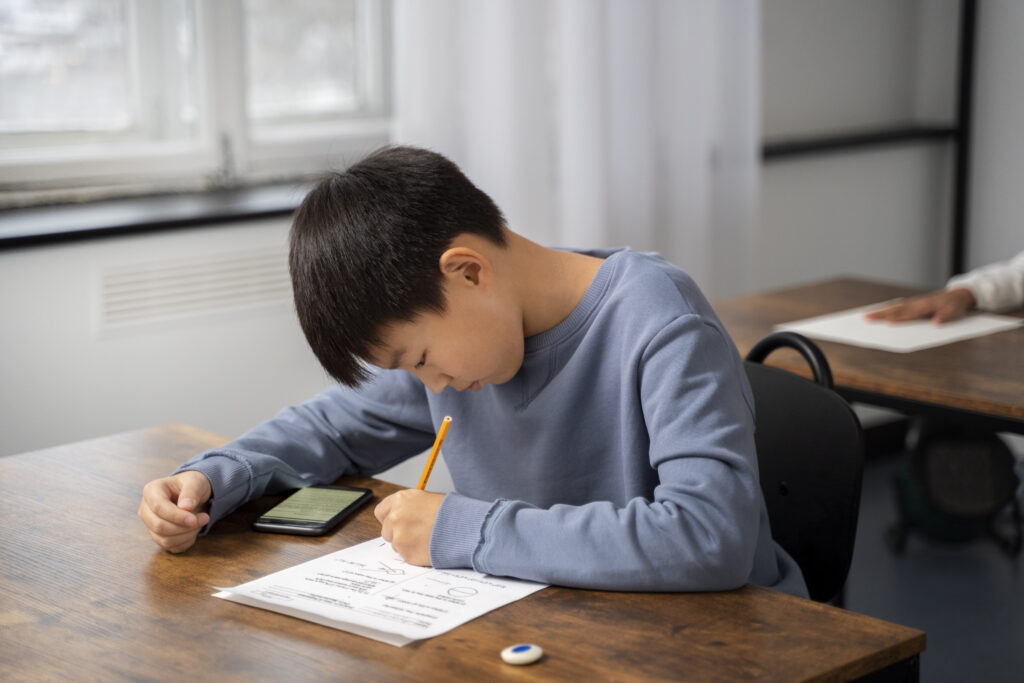“Real progress doesn’t come from more time; it comes from better strategy.”

Most students think better grades come from studying longer hours, but the truth is, it’s not just about how much you study, it’s about how you study. You can spend an entire day at your desk and still not make real progress if your methods aren’t working. That’s why this article isn’t about pushing you to grind harder; it’s about helping you study smarter. We’re going to look at study habits you might need to quit so you can avoid common mistakes and move closer to the grades you’re aiming for.
Are You Memorising or Actually Learning?

A lot of students fall into the trap of trying to memorise every line in the textbook. Every definition, every bullet point, every sentence the teacher highlights. It feels productive because you’re “covering” everything. But when exams are over, most of that information disappears within days or weeks. That’s because memorising without understanding doesn’t give your brain anything meaningful to hold on to. You might recognise the words, but if the question is slightly different from what you memorised, you’re stuck.
Understanding concepts takes more time, and honestly, it can feel slower at the beginning. You have to ask questions, connect ideas, and sometimes struggle a bit before it clicks. But once it does, it stays with you much longer than rote learning ever will. When you understand the idea behind a formula, a theory, or an event, you can apply it in different situations, not just repeat it word for word. That’s why it’s important to balance both: know the key terms and definitions, but make sure you truly understand what they mean and how they work.
Writing Way Too Many Notes

Some students write down everything during lectures and basically transcribe entire chapters from textbooks. Every sentence feels important, so nothing gets left out. Loads of people do this but the problem is, this approach eats up huge amounts of time and energy. After hours of writing, you’re left with beautiful notes… that you still have to actually study. Copying information isn’t the same as processing it, and it’s definitely not the most efficient way to learn.
Instead of trying to record every word, shift your focus to what actually helps you prepare for exams. Start with past papers and practise questions, then work backwards. When you attempt questions, you quickly see which topics come up often and what kind of answers are expected. From there, you can identify what information is actually useful and what’s just extra detail. Your notes don’t need to look like a textbook, they need to help you answer questions. Keep them shorter, focused, and built around understanding how to apply the material, not just rewriting it.
The Group Study Trap

Studying with others can actually be one of the most effective ways to learn. When you check your problem-solving with friends or quiz each other on key topics, you spot gaps in your understanding and strengthen what you already know. It also makes the whole process more engaging. But here’s the problem: if your study sessions turn into chat sessions before the work is done, you’re not really studying. It’s an easy habit to fall into. You start with good intentions, then suddenly you’re talking about everything except the subject. When that keeps happening, you’re wasting time, and it might be a sign you need to reset the way your group works (or even rethink the group itself).
If you’re going to study together, make it structured. Start testing each other right away instead of “warming up” with small talk. Set a clear goal for the session. For example, finishing a set of practice questions or reviewing one full topic. Then block out a specific time to catch up and talk during breaks, so it doesn’t spill into your work time. Hold each other accountable. If someone gets distracted, gently bring the focus back. Group study works best when everyone treats it like real study time first, social time second. Check out: The Benefits of Small Group Tuition Over One-on-One Tuition.
The Procrastination Loop

Procrastinating usually doesn’t look dramatic. It starts small. You tell yourself you’ll study after one episode of your favourite series. But when that episode ends, the next one auto-plays and you think, “Just one more.” Or you decide to finish one game first, but when you lose, the urge to try again pulls you right back in. Five minutes turns into fifteen, then thirty, then suddenly an hour is gone. You end up looking for any excuse or distraction other than actually getting started. The longer you delay, the heavier the task feels, which makes it even harder to begin.
Instead of letting distractions control your time, flip the script and turn them into rewards. Study first, then earn your break. For example, tell yourself that after finishing a full study session or completing 50 quiz questions, you get to watch an episode or play a game. This way, entertainment becomes something you look forward to, not something that steals your time. Keep your priorities clear, handle what matters most first, then relax without guilt.
The Comfort Zone Problem

A study habit that seems effective but isn’t very helpful in the long run is repeatedly solving the same type of problems. You sit there doing question after question that looks almost identical to the previous one. It feels comfortable because you already know the method, and you keep getting the answers right. But if you’re only practising what you’re familiar with, you’re not really challenging your brain.
If you want to truly master a topic, you need to mix things up. Instead of sticking to one familiar format, try different types of questions, especially the ones that are slightly harder or less straightforward. Combine topics in one practice session so your brain has to switch strategies. Push yourself with questions that require deeper thinking, not just applying the same steps again and again. When you vary your practice and raise the level of challenge, you prepare yourself to handle unexpected exam questions more effectively.
Assuming You’ve Mastered It

This one is even worse than staying in your comfort zone with familiar questions. At least you’re practising in that situation. Here, you’re not even trying. You look at a question and think, “I already know this,” so you skip it. It seems easy, so you assume you’ll handle it during the exam. Quite a few students think that because they use certain skills every day, there’s no need to practise them. But exam conditions are different. On the actual day, pressure builds up, your mind freezes, and suddenly the “easy” things don’t come as smoothly as you expected.
For example, you might think English grammar and essay writing are simple because you read and write all the time, but in the exam you could end up writing something like, “Despite the students were aware of the rules, they don’t realised that their arguments lacks evidence and is not organised properly,” mixing up sentence structure, subject-verb agreement, and verb tenses all in one go. The correct version should be: “Although the students were aware of the rules, they did not realise that their arguments lacked evidence and were not organised properly.” These are foundational skills, yet they’re often the ones that fall apart under pressure. The solution is simple: practise anyway. Even if something seems easy, train it until it becomes automatic. Review key formats, do editing drills, and plan essays under timed conditions. The more you practise, the more prepared you’ll be when it counts.
The Last-Minute Exam Study Habit

A lot of students only start studying seriously when exams are just around the corner. At first, it feels manageable, there’s still time, right? But as the exam date gets closer, that delay turns into stress, panic, and a few sleepless nights trying to cram everything at once. You’re not just learning the material; you’re racing against the clock. Last-minute pressure might push you to focus for a short time, but it’s exhausting and overwhelming.
What works better is steady, consistent study, even if it feels a bit boring compared to the rush of cramming. Reviewing topics early and in small chunks gives you more time to actually understand what you’re learning instead of memorising it in a hurry. Try setting a simple weekly review schedule, even if it’s just 30–45 minutes per subject. Go over class notes, attempt a few practice questions, and clear up confusion while the topic is still fresh. When exam season arrives, you’re revising instead of relearning everything from scratch and that changes the entire experience.
The Fear of Asking Questions

We’ve all been there. The teacher explains something, everyone around you is nodding, and you’re just sitting there thinking, “Wait… what?” But instead of raising your hand, you stay quiet. Maybe you feel shy. Maybe you think your question is too simple. Maybe you’re worried your friends will laugh. So you tell yourself you’ll figure it out later. The problem is, “later” doesn’t always come and that small confusion slowly turns into a bigger gap in understanding.
Asking questions doesn’t make you look weak. In fact, teachers usually appreciate students who are active in class because it shows you’re trying. And most of the time, if you’re confused, a few of your classmates probably are too, they’re just hoping someone else will ask first. Learning is recursive, which means you often need to revisit ideas and approach them in different ways before they fully click. That’s normal. If speaking up during class feels uncomfortable, ask your teacher after the lesson ends or send a message online.
At Curio, our new Independent Programme is designed to support what students are currently covering in school. Parents can inform us of the topics being taught, and our teachers will upload personalised materials through Google Classroom. Your completed work is marked carefully and returned with detailed feedback so you know exactly where to improve.
Independent Lite includes one personalised worksheet uploaded every Friday, marked and returned within a week of completion — $200 nett per month.
Independent Unlimited allows you to request any number of worksheets throughout the week, all marked once completed — $320 nett per month.
We also offer Video Consultation at $40 per half hour, which is especially helpful before major tests or project deadlines.

























































































































